Module 10 Spring Festival Unit 2 My mother's cleaning our house and sweeping away bad luck. 课件(33张P
文档属性
| 名称 | Module 10 Spring Festival Unit 2 My mother's cleaning our house and sweeping away bad luck. 课件(33张P |
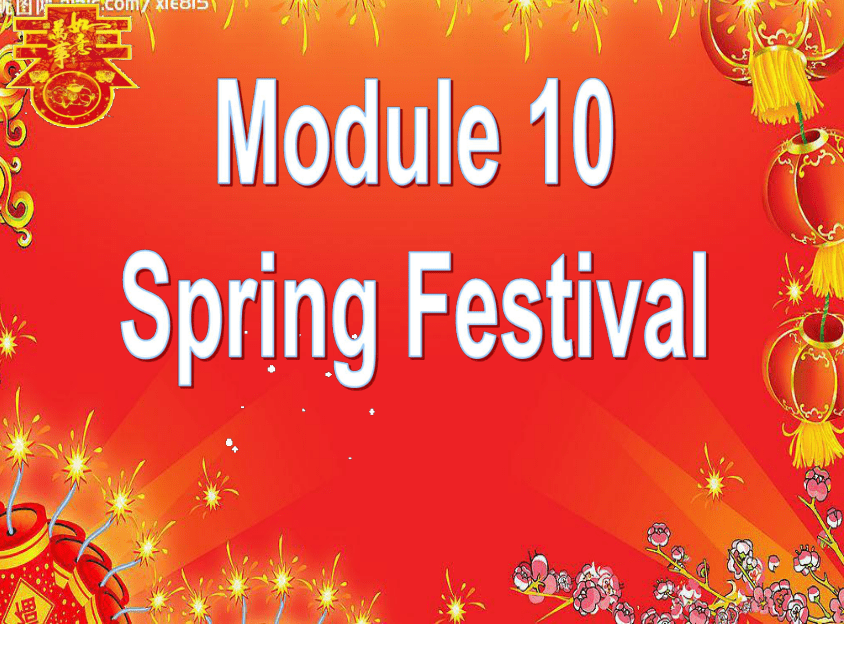
|
|
| 格式 | ppt | ||
| 文件大小 | 2.9MB | ||
| 资源类型 | 教案 | ||
| 版本资源 | 外研版 | ||
| 科目 | 英语 | ||
| 更新时间 | 2020-07-22 00:00:00 | ||
图片预览


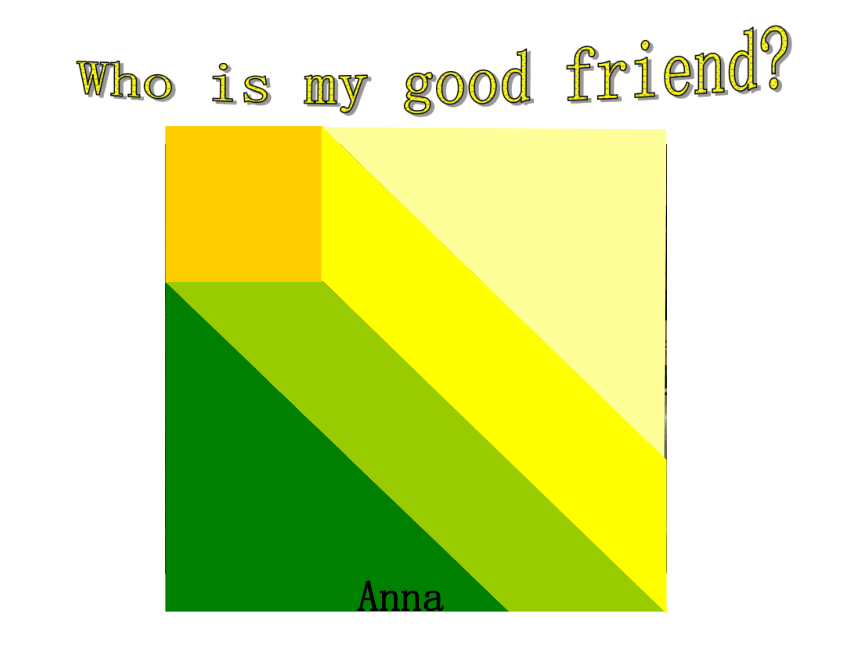
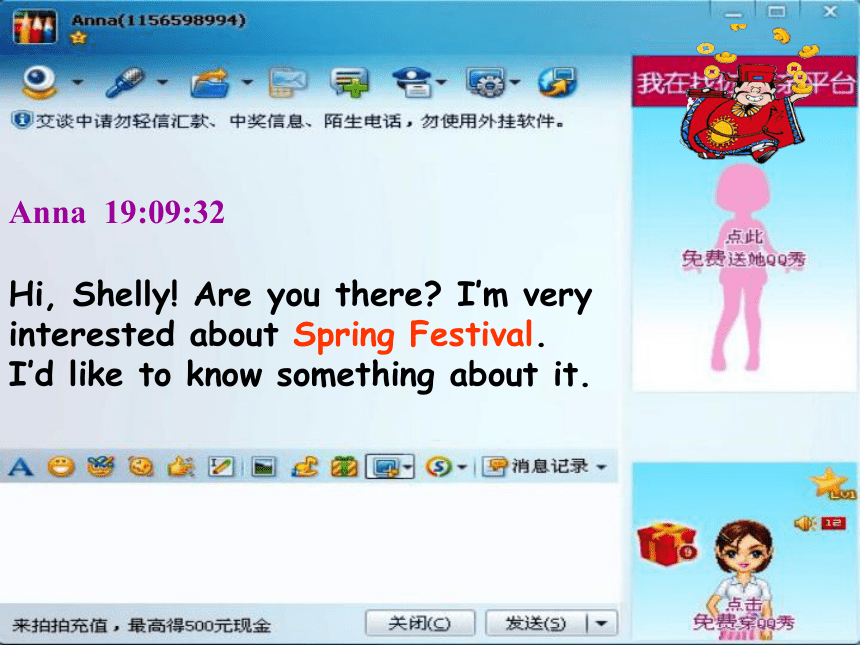
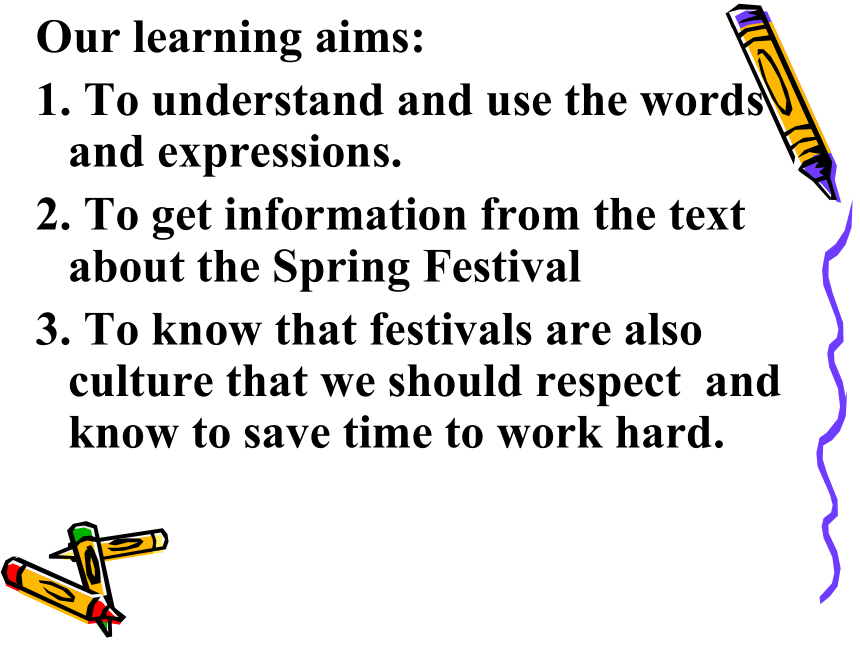

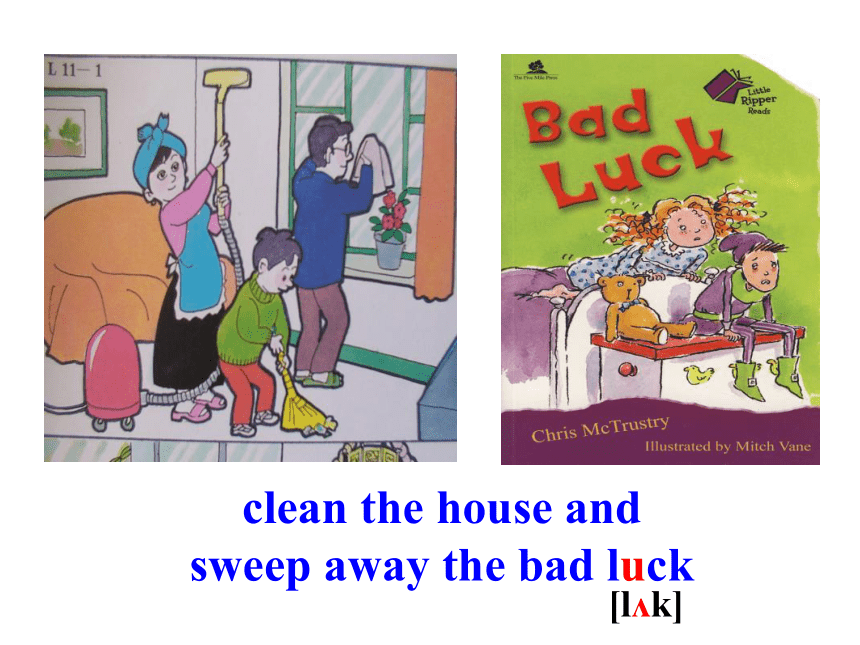
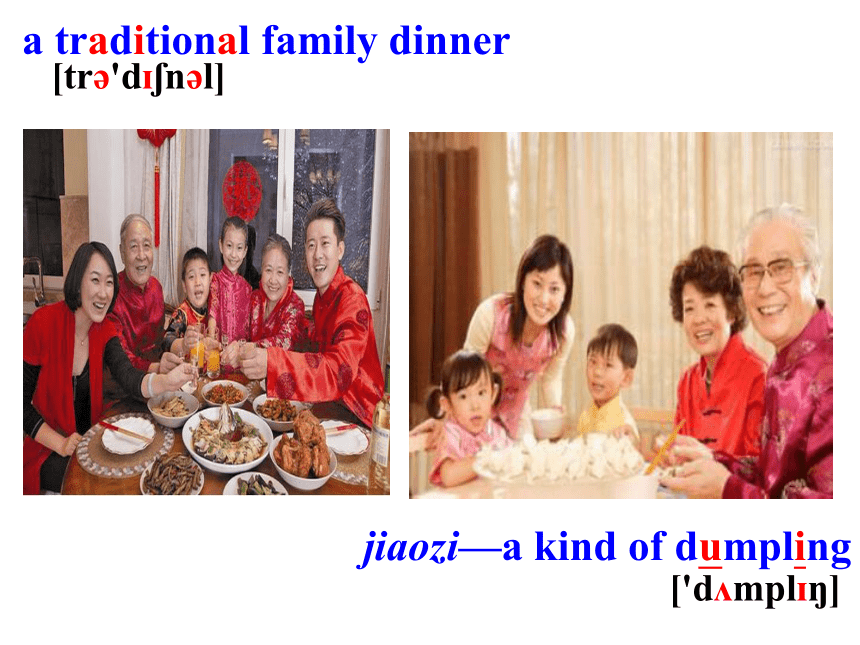
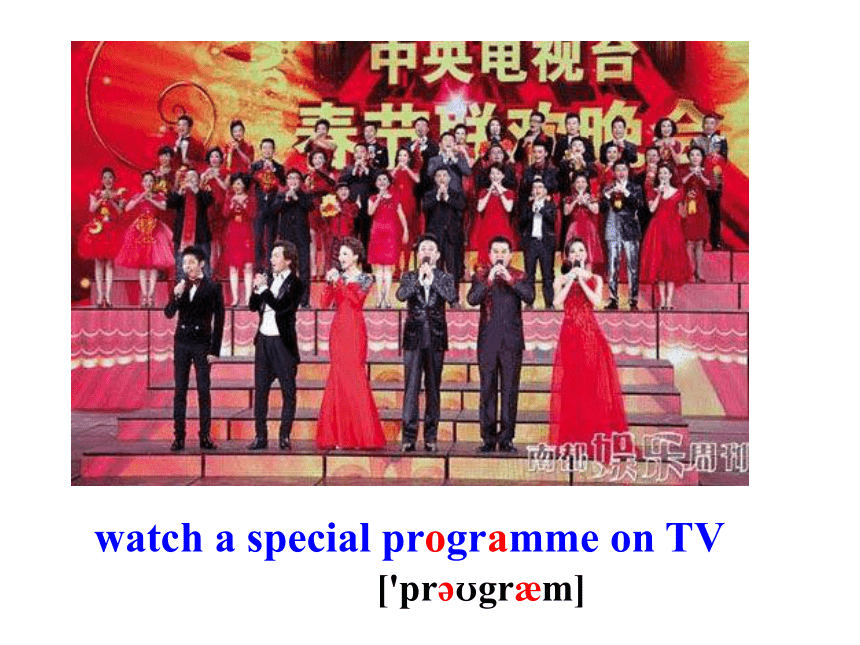
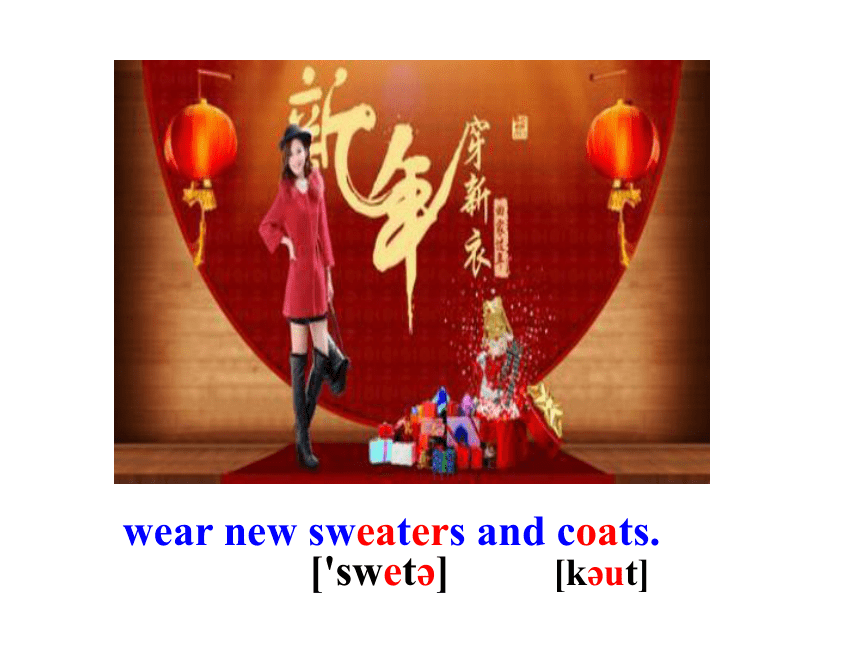
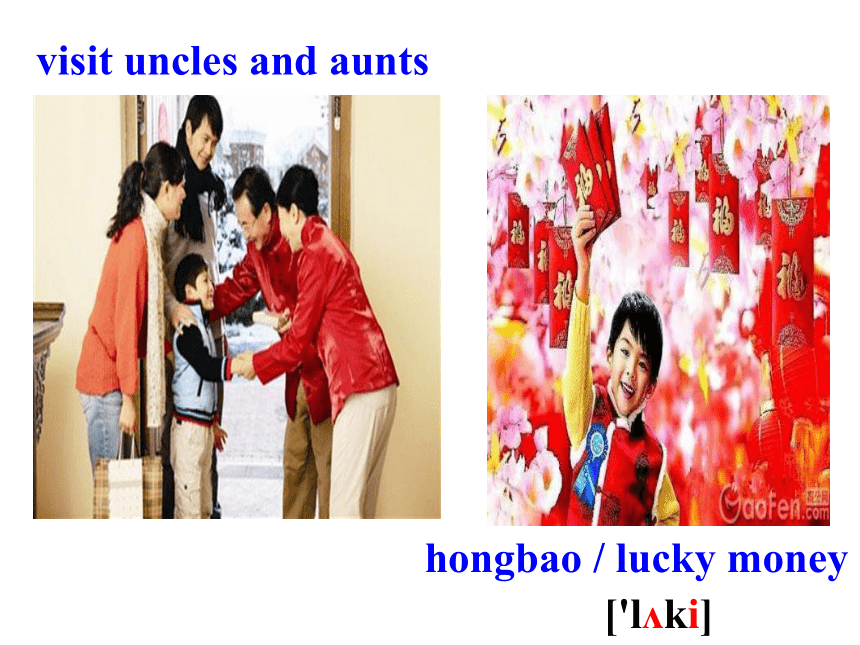
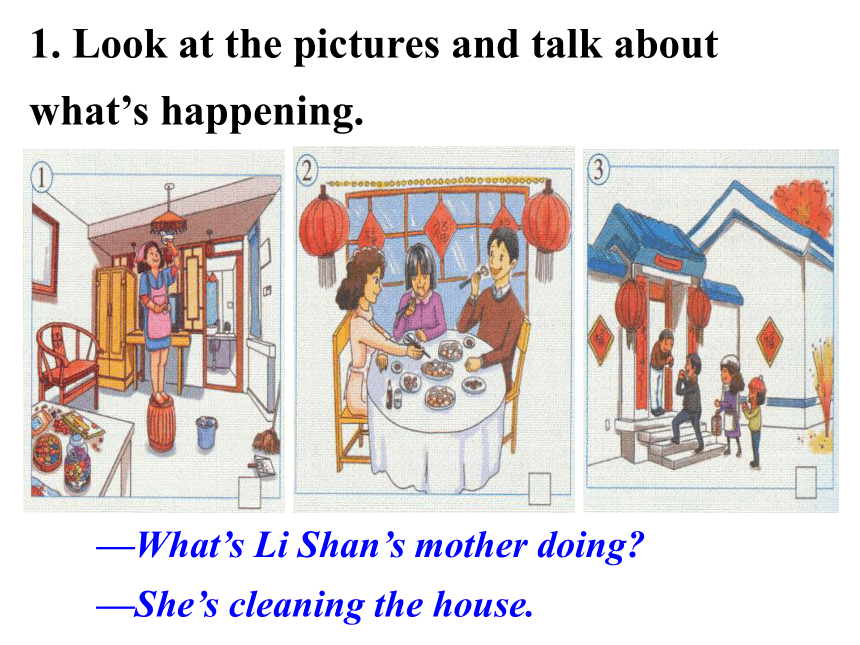
文档简介
My mother’s cleaning our house and sweeping away bad luck.
Anna
Anna 19:09:32
Hi, Shelly! Are you there? I’m very interested about Spring Festival.
I’d like to know something about it.
Our learning aims:
1. To understand and use the words and expressions.
2. To get information from the text about the Spring Festival
3. To know that festivals are also culture that we should respect and know to save time to work hard.
Spring Festival is our traditional festival.
Do you know how to celebrate it?
['sel?bre?t]
clean the house and
sweep away the bad luck
[l?k]
a traditional family dinner
jiaozi—a kind of dumpling
[tr?'d??n?l]
['d?mpl??]?
watch a special programme on TV
['pr??gr?m]
wear new sweaters and coats.
['swet?]
[k?ut]
hongbao / lucky money
['l?ki]
visit uncles and aunts
—What’s Li Shan’s mother doing?
—She’s cleaning the house.
1. Look at the pictures and talk about what’s happening.
1.Spring Festival is very __________ in my
country.
2.It usually comes in __________, but
sometimes it comes in __________.
Read the paragraph 1 and fill in the blanks.
important
February
January
1.在同一天
2.一些照片
3.看一看
1. on the same day
2. some photos
3. have a look
Find out the phrases.
Read the paragraph A and answer the questions.
1.What's her mother doing?
2. What do they usually buy before the festival?
She is cleaning the house and sweeping away bad luck.
They usually buy a lot of food before the festival.
1. 春节前几天
2. 扫走霉运
a few days beforeSpring Festival
sweep away bad luck
Find out the phrases.
1.They are celebrating the Spring Festival
with watching a special programme on the
evening before Spring Festival . ( )
2. After the dinner, we usually watch a
special programme on TV. ( )
Read the paragraph B and do the T or F.
T
1.庆祝春节
2.在除夕夜
3.一个特别的
电视节目
1. celebrate Spring Festival
2. on the evening before Spring
Festival
3. a special programme on TV
F
a traditional family dinner
Find out the phrases.
Read the paragraph C and answer the questions.
1.Who are they visiting?
2. What does hongbao means?
They are visiting her uncles and aunts.
It means lucky money.
1.拜访叔叔阿姨
2.穿着新毛衣
3.压岁钱
1. visit one’s uncles and aunts
2. wear new sweaters
3. lucky money
Find out the phrases.
Read the passage quickly again and complete the table about the 3 photos.
a few days before Spring Festival
on the eveing before Spring Festival
on Spring Festival
Clean the house and sweep away bad luck
Buy a lot of food
Celebrate Spring Festival with a traditional family dinner
Watch a special programme on TV
Visit uncles and aunts
Wear new sweaters and coats
We are celebrating Spring Festival with a traditional family dinner .
在除夕夜, 我们以传统的年夜饭来庆祝春节。
with prep. 和,带有,用
She goes shopping with me.
她和我一起去逛街。
Uncle Li is a tall man with a long white beard.
李叔叔是一位留着长胡子的高个头男士。
We decorate the windows with paper cuts.
我们用剪纸装饰窗户。
2. It’s a few days before Spring Festival.
a few一些,表示肯定的概念,修饰可数名词复数。few作形容词,表示否定的概念, 为“几乎没有”,修饰可数名词复数。
拓展:few, a few, little, a little这四个词
都有“一点儿”的意思,其用法既有相同
之处,又有相异之处。读下面例子并总结:
【结论】
few
意为“很少;几乎没有”,表否定含义
修饰_____名词复数
a few
意为“几个;有一些”,表肯定含义
little
意为“很少;几乎没有”,表否定含义
修饰_______
名词
a little
意为“一点;一些”,表肯定含义
不可数
可数
【运用】
请根据句意选用few, a few, little或a little填空。
There are _____ books on the desk. You can borrow one.
2. We have ____ rain this spring. The trees
and grass don’t grow well.
3. There are ____ new words in the text, but I
don’t understand it.
4. — May I talk with you, Lucy?
— Sure, but only ______ time. I
am very busy.
a few
little
few
a little
Complete the passage with the correct words.
We (1) _________ Spring Festival in January or February. A (2) _____ days before Spring Festival we clean our homes and (3) ___________ all the bad (4) _____. In the evening before Spring Festival we have a big family dinner. We eat lots of (5) _________ food, such as jiaozi – a kind of (6) __________. We usually watch a special (7) ___________ on television, and parents usually give their children a hongbao. It (8) ______ lucky money.
celebrate
few
sweep away
luck
traditional
dumplings
programme
means
4. Look at the notes about Christmas in
Britain. Match the notes with the headings.
a) go shopping for presents
b) have a traditional family dinner
c) open presents on Christmas Day
d) put the presents next to the Christmas tree
e) get lots of food ready
f) sing Christmas songs
g) say Merry Christmas to family and friends
h) have a Christmas tree
Getting ready ____________
Presents ____________
Traditional things on Christmas Day _____________
a, d, e, h
a, c, d
b, c, f, g, h
Join two notes and write one sentence with and.
For example: go shopping for presents;
get lots of food ready
They go shopping for presents
and they get lots of food ready.
You can leave out the second they.
They go shopping for presents
and get lots of food ready.
5. Write sentences with the notes in
Activity 4.
Now try to write an article about Christmas Day with the giving beginning.
Christmas Day is very important for western country. Before it, they go shopping for presents and get lots of food ready... On Christmas Day, they...__________________
_____________________________________
_____________________________________.
单项选择.
1. We have ____ food.
A. lots of B. a few C. many
2. There ____ dragon and lion dancing.
A. is B. are C. be
3. Everyone ____ got a piece of cake.
A. is B. has C. there is
4. Red ____ good luck.
A. means B. meaning C. mean
5. We ________ ready for Spring Festival.
A. are gets B. are getting
C. getting for
Words: Christmas February before luck
celebrate tradition dumpling
programme sweater coat lucky
Phrases: on the same day
a few days
sweep away bad luck
Spring Festival is very important in our country.
Remember and write all the new words and expressions we've learned today.
2. Introduce Christmas Day to your friends.
一年之计在于春!
So ,we can say to Anna:
Anna
Anna
Anna 19:09:32
Hi, Shelly! Are you there? I’m very interested about Spring Festival.
I’d like to know something about it.
Our learning aims:
1. To understand and use the words and expressions.
2. To get information from the text about the Spring Festival
3. To know that festivals are also culture that we should respect and know to save time to work hard.
Spring Festival is our traditional festival.
Do you know how to celebrate it?
['sel?bre?t]
clean the house and
sweep away the bad luck
[l?k]
a traditional family dinner
jiaozi—a kind of dumpling
[tr?'d??n?l]
['d?mpl??]?
watch a special programme on TV
['pr??gr?m]
wear new sweaters and coats.
['swet?]
[k?ut]
hongbao / lucky money
['l?ki]
visit uncles and aunts
—What’s Li Shan’s mother doing?
—She’s cleaning the house.
1. Look at the pictures and talk about what’s happening.
1.Spring Festival is very __________ in my
country.
2.It usually comes in __________, but
sometimes it comes in __________.
Read the paragraph 1 and fill in the blanks.
important
February
January
1.在同一天
2.一些照片
3.看一看
1. on the same day
2. some photos
3. have a look
Find out the phrases.
Read the paragraph A and answer the questions.
1.What's her mother doing?
2. What do they usually buy before the festival?
She is cleaning the house and sweeping away bad luck.
They usually buy a lot of food before the festival.
1. 春节前几天
2. 扫走霉运
a few days beforeSpring Festival
sweep away bad luck
Find out the phrases.
1.They are celebrating the Spring Festival
with watching a special programme on the
evening before Spring Festival . ( )
2. After the dinner, we usually watch a
special programme on TV. ( )
Read the paragraph B and do the T or F.
T
1.庆祝春节
2.在除夕夜
3.一个特别的
电视节目
1. celebrate Spring Festival
2. on the evening before Spring
Festival
3. a special programme on TV
F
a traditional family dinner
Find out the phrases.
Read the paragraph C and answer the questions.
1.Who are they visiting?
2. What does hongbao means?
They are visiting her uncles and aunts.
It means lucky money.
1.拜访叔叔阿姨
2.穿着新毛衣
3.压岁钱
1. visit one’s uncles and aunts
2. wear new sweaters
3. lucky money
Find out the phrases.
Read the passage quickly again and complete the table about the 3 photos.
a few days before Spring Festival
on the eveing before Spring Festival
on Spring Festival
Clean the house and sweep away bad luck
Buy a lot of food
Celebrate Spring Festival with a traditional family dinner
Watch a special programme on TV
Visit uncles and aunts
Wear new sweaters and coats
We are celebrating Spring Festival with a traditional family dinner .
在除夕夜, 我们以传统的年夜饭来庆祝春节。
with prep. 和,带有,用
She goes shopping with me.
她和我一起去逛街。
Uncle Li is a tall man with a long white beard.
李叔叔是一位留着长胡子的高个头男士。
We decorate the windows with paper cuts.
我们用剪纸装饰窗户。
2. It’s a few days before Spring Festival.
a few一些,表示肯定的概念,修饰可数名词复数。few作形容词,表示否定的概念, 为“几乎没有”,修饰可数名词复数。
拓展:few, a few, little, a little这四个词
都有“一点儿”的意思,其用法既有相同
之处,又有相异之处。读下面例子并总结:
【结论】
few
意为“很少;几乎没有”,表否定含义
修饰_____名词复数
a few
意为“几个;有一些”,表肯定含义
little
意为“很少;几乎没有”,表否定含义
修饰_______
名词
a little
意为“一点;一些”,表肯定含义
不可数
可数
【运用】
请根据句意选用few, a few, little或a little填空。
There are _____ books on the desk. You can borrow one.
2. We have ____ rain this spring. The trees
and grass don’t grow well.
3. There are ____ new words in the text, but I
don’t understand it.
4. — May I talk with you, Lucy?
— Sure, but only ______ time. I
am very busy.
a few
little
few
a little
Complete the passage with the correct words.
We (1) _________ Spring Festival in January or February. A (2) _____ days before Spring Festival we clean our homes and (3) ___________ all the bad (4) _____. In the evening before Spring Festival we have a big family dinner. We eat lots of (5) _________ food, such as jiaozi – a kind of (6) __________. We usually watch a special (7) ___________ on television, and parents usually give their children a hongbao. It (8) ______ lucky money.
celebrate
few
sweep away
luck
traditional
dumplings
programme
means
4. Look at the notes about Christmas in
Britain. Match the notes with the headings.
a) go shopping for presents
b) have a traditional family dinner
c) open presents on Christmas Day
d) put the presents next to the Christmas tree
e) get lots of food ready
f) sing Christmas songs
g) say Merry Christmas to family and friends
h) have a Christmas tree
Getting ready ____________
Presents ____________
Traditional things on Christmas Day _____________
a, d, e, h
a, c, d
b, c, f, g, h
Join two notes and write one sentence with and.
For example: go shopping for presents;
get lots of food ready
They go shopping for presents
and they get lots of food ready.
You can leave out the second they.
They go shopping for presents
and get lots of food ready.
5. Write sentences with the notes in
Activity 4.
Now try to write an article about Christmas Day with the giving beginning.
Christmas Day is very important for western country. Before it, they go shopping for presents and get lots of food ready... On Christmas Day, they...__________________
_____________________________________
_____________________________________.
单项选择.
1. We have ____ food.
A. lots of B. a few C. many
2. There ____ dragon and lion dancing.
A. is B. are C. be
3. Everyone ____ got a piece of cake.
A. is B. has C. there is
4. Red ____ good luck.
A. means B. meaning C. mean
5. We ________ ready for Spring Festival.
A. are gets B. are getting
C. getting for
Words: Christmas February before luck
celebrate tradition dumpling
programme sweater coat lucky
Phrases: on the same day
a few days
sweep away bad luck
Spring Festival is very important in our country.
Remember and write all the new words and expressions we've learned today.
2. Introduce Christmas Day to your friends.
一年之计在于春!
So ,we can say to Anna:
Anna
同课章节目录
- Starte
- Module 1 My teacher and my friends
- Module 2 My English lesson
- Module 3 My English book
- Module 4 My everyday life
- Module 1 My classmates
- Unit 1 Nice to meet you.
- Unit 2 I'm Wang Lingling and I'm thirteen years ol
- Unit 3 Language in use.
- Module 2 My family
- Unit 1 Is this your mum?
- Unit 2 These are my parents.
- Unit 3 Language in use.
- Module 3 My school
- Unit 1 There are thirty students in my class.
- Unit 2 The library is on the left of the playgroun
- Unit 3 Language in use.
- Module 4 Healthy food
- Unit 1 We've got lots of apples.
- Unit 2 Is your food and drink healthy?
- Unit 3 Language in use.
- Module 5 My school day
- Unit 1 I love history.
- Unit 2 We start work at nine o'clock.
- Unit 3 Language in use.
- Revision module A
- Module 6 A trip to the zoo
- Unit 1 Does it eat meat?
- Unit 2 The tiger lives in Asia.
- Unit 3 Language in use.
- Module 7 Computers
- Unit 1 How do I write my homework on the computer?
- Unit 2 When do you use a computer?
- Unit 3 Language in use.
- Module 8 Choosing presents
- Unit 1 I always like birthday parties.
- Unit 2 She often goes to concerts.
- Unit 3 Language in use.
- Module 9 People and places
- Unit 1 We're enjoying the school trip a lot.
- Unit 2 They're waiting for buses or trains.
- Unit 3 Language in use.
- Module 10 Spring Festival
- Unit 1 Are you getting ready for Spring Festival?
- Unit 2 My mother's cleaning our houses and sweepin
- Unit 3 Language in use.
- Revision module B
